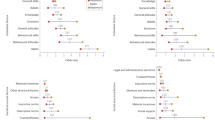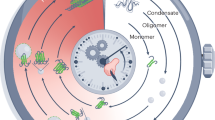Abstract
Banks, Damjanovic and Vernon1 suggest that the observed compensation effect in the rates of some biological processes might be wholly artefactual. Their argument is one which would also apply to systems of purely chemical interest and raises the question of whether, in the inevitable presence of experimental errors, a true compensation effect is ever observable.
This is a preview of subscription content, access via your institution
Access options
Subscribe to this journal
Receive 51 print issues and online access
$199.00 per year
only $3.90 per issue
Buy this article
- Purchase on Springer Link
- Instant access to full article PDF
Prices may be subject to local taxes which are calculated during checkout
Similar content being viewed by others
References
Banks, B. E. C., Damjanovic, V., and Vernon, C. A., Nature, 240, 147 (1972).
Bond, G. C., Catalysis by Metals (Academic Press, London, 1962).
Cremer, E., Adv. Catalysis, 7, 75 (1956).
Author information
Authors and Affiliations
Rights and permissions
About this article
Cite this article
HARRIS, P. Compensation Effect and Experimental Error. Nature 243, 401–402 (1973). https://doi.org/10.1038/243401b0
Received:
Issue Date:
DOI: https://doi.org/10.1038/243401b0
This article is cited by
-
An electrophysiological study of skeletal muscle fibres in the ‘muscular dysgenesis’ mutation of the mouse
Pflügers Archiv - European Journal of Physiology (1987)
Comments
By submitting a comment you agree to abide by our Terms and Community Guidelines. If you find something abusive or that does not comply with our terms or guidelines please flag it as inappropriate.



